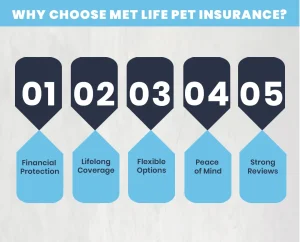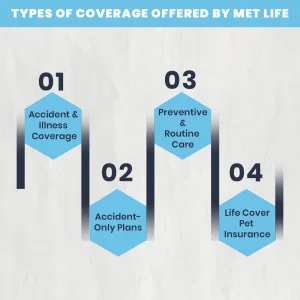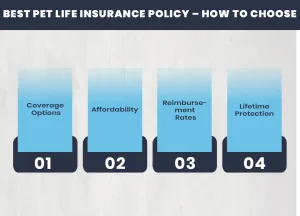Met Life Pet Insurance – Affordable Life Cover for Pets
Last Updated on: September 12th, 2025
Reviewed by Dylan
- Licensed Agent
- - @InsureGuardian
Key Takeaways
- Affordable and flexible pet insurance
- Covers accidents, illnesses, and preventive care
- Life insurance for pets
- Trusted company with good reviews
Furry friends are always by your side because they are your best friends and their protection is important. Pets give us love, joy, and comfort every day. For so many people, cats and dogs are like their family, and keeping them healthy is very important for them. But pets can get sick they have some other problems while playing or running. With Met Life, you get easy and affordable plans that will bring peace of mind. This guide will explain Met Life Pet Insurance, its expenses, coverage, and reviews, and compare it with other options like Colonial Life Pet Insurance.
Table of Contents
ToggleWhat Is Pet Life Insurance?
When most people hear “life insurance,” they think it’s only for humans. But no, the life insurance is also for the pets. Life insurance pet insurance help with any unexpected vet bills and sometimes cover the expenses if your pet passes away. There are some plans that even give you money to help with the cremation, burial and getting another pet for you. MetLife offers you pet life insurance with flexible options, making it one of the top choices in the U.S.
Why Choose Met Life Pet Insurance?
MetLife has been a trusted insurance company for so many years. Its pet life insurance is also easy to get and affordable. Many pet owners pick MetLife because of these benefits:
1. Financial Protection
Vet bills can cost a few hundred dollars for small problems and thousands for big treatments like surgery or cancer. Pet life insurance helps you pay for the best care without using up all your savings.
2. Lifelong Coverage
With options like life long pet insurance and covered for life pet insurance, your pets are protected from puppyhood or kittenhood through their senior years.
3. Flexible Options
How Much Does Life Isurance Cost?
No matter if you need accident-only protection or comprehensive whole life pet insurance, Met Life lets you tailor your plan.
4. Peace of Mind
Knowing your pets are covered helps you focus on what matters most that is enjoying life with them.
5. Strong Reviews
Based on Met Life Pet Insurance reviews, customers appreciate fast reimbursements, affordable premiums, and great customer support.

Types of Coverage Offered by Met Life
MetLife offers a gives you a wide range of pet insurance life cover options. These plans can be customized depending on your budget and your pet’s needs.
1. Accident & Illness Coverage
This is the most popular option. It covers medical care when your pet gets injured in an accident or develops illnesses such as arthritis, diabetes, or cancer.
2. Accident-Only Plans
If you are on a budget, accident-only plans are the only way to protect against broken bones, injuries, poisoning, and emergencies.
3. Preventive & Routine Care
You can choose extra coverage that helps pay for vaccines, flea and tick treatments, yearly checkups, dental cleanings, and other care.
4. Life Cover Pet Insurance
Some Met Life plans include a pet life insurance death benefit, which means that they provide financial support if your pet passes away. This will help cover cremation, burial, or memorial expenses.

Met Life Insurance Pet Cost
The pet life insurance cost varies based on:
- Type of pet like the dogs can cost more than cats.
- Breed (some breeds have higher medical risks)
- Age (older pets have higher premiums)
- Coverage level (basic accident-only vs. comprehensive whole life pet insurance)
On average, here’s what you can expect:
- Cats: $15 to $60 per month
Dogs: $25 to $70 per month
Pet Life Insurance Payouts
Life insurance on pets gives you a lot of benefits. One of the biggest benefits of having a pet life insurance policy is knowing how payouts work.
- Medical Expenses
Met Life typically reimburses 70%–100% of eligible veterinary bills.
- Death Benefits
In case of your pet’s passing, some policies include a pet life insurance payout to cover cremation, burial, or memorial costs.
Pet Life Insurance for Dogs and Cats
Dogs
Dogs are very active pets, so they can easily get hurt, have accidents while running or playing, or develop health problems. Pet life insurance for dogs helps cover these costs and keeps your dog protected at every age.
Cats
Cats can live longer than dogs, which means that they are more likely to have the critical conditions later in the life. With pet insurance cat life cover, you can provide your cat with ongoing care without worrying about expenses
Both dogs and cats benefit from covered for life pet insurance, which ensures they remain protected even as they age.
Whole Life Pet Insurance – Long-Term Protection
Whole life pet insurance will give you lifelong coverage for your pet. This type of life insurance policy is especially valuable for the breeds to their severe illness.
Lets have a look at the benefits of whole life pet insurance:
- Your pet remains covered, no matter how old they get
- Premiums stay predictable
- Provides both medical and death benefit coverage
- Considered one of the best life pet insurance policies for long-term peace of mind
Met Life vs. Colonial Life Pet Insurance
If you’re comparing providers, here’s a quick breakdown:
| Met Life pet Insurance | Colonial Life Pet Insurance |
| Comprehensive coverage | Limited options |
| Preventive care add-ons | Mostly accident-only plans |
| Lifelong protection | Fewer add-ons |
| Optional pet life insurance death benefit | Less flexibility in coverage |
Best Pet Life Insurance Policy – How to Choose
When selecting the best pet life insurance policy, keep these factors in mind:
1. Coverage Options
Does the plan include accident, illness, preventive care, and death benefits?
2. Affordability
Compare the pet life insurance cost with other providers.
3. Reimbursement Rates
Choose a plan that reimburses 70%–100% of vet bills.
4. Lifetime Protection
Opt for life cover insurance for pets to ensure coverage doesn’t end when your pet ages.
Met Life pet insurance consistently ranks among the best life pet insurance providers for its balance of affordability and comprehensive protection.

Conclusion
Pets are family, and their health has to come first. Met Life Pet Insurance is there to offer you an affordable and easy plans that will cover your pets visits to the doctor, accidents or any illness and even end of life expenses. You have to make sure that what you choose and what is best for you and your pet. Met life pet insurance provide you the best plans the makes sure your pets are safe and get the best care without financial stress, giving you the stress free life from your furry friends.
FAQs about Met Life Pet Insurance
1. How much is MetLife Pet Insurance per month?
MetLife plans usually cost $15–$60 for cats and $25–$70 for dogs each month. But you have to keep in mind that the exact price depends on your pet’s age, breed, and chosen coverage level.
2. Who offers the best pet insurance?
It depends on what you need. Pets Best, Figo, Spot, and Lemonade are often the top rated companies for coverage, price, and claim service, while Met Life pet insurance is solid for comprehensive plans.
3. Is MetLife good at paying claims?
Yes, many users report smooth claims, often processed in about 10 days. However, some claims may be delayed or denied if the condition is pre-existing or missing documentation.
4. Does MetLife Pet Insurance cover end of life?
Yes, it can cover euthanasia, cremation, and burial expenses up to $500. Some plans also offer a lot of other things, but coverage depends on the policy and conditions like pre-existing illnesses.

Expert Life Insurance Agent and health insurance agent
Dylan is your go-to guy for life and health insurance at InsureGuardian. He’s helped over 2,500 clients just like you figure out the best insurance plans for their needs. Before joining us, Dylan was sharing his expertise on TV with Global News and making a difference with various charities focused on health. He’s not just about selling insurance; he’s passionate about making sure you’re covered for whatever life throws your way.
